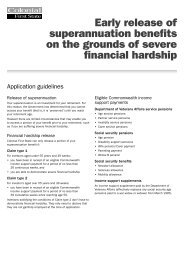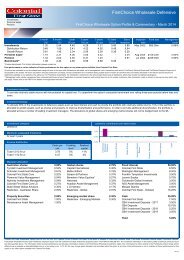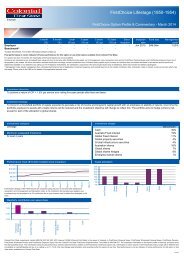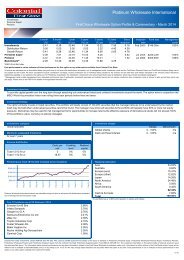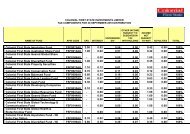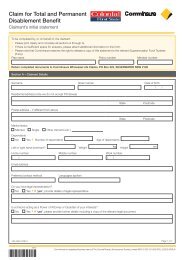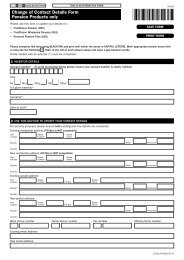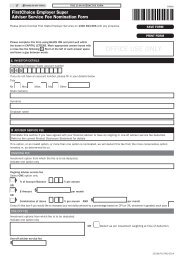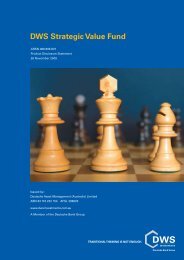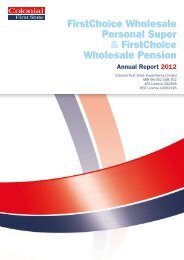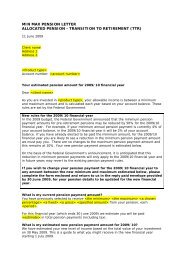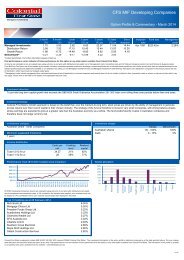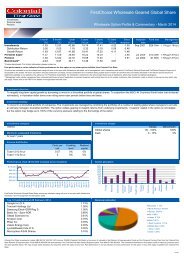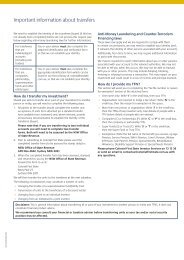Boost your retirement funds – salary sacrifice - Colonial First State
Boost your retirement funds – salary sacrifice - Colonial First State
Boost your retirement funds – salary sacrifice - Colonial First State
You also want an ePaper? Increase the reach of your titles
YUMPU automatically turns print PDFs into web optimized ePapers that Google loves.
An effective ‘<strong>salary</strong> <strong>sacrifice</strong>’ strategy now could be<br />
the key to getting more from <strong>your</strong> super in the future.<br />
What is <strong>salary</strong> <strong>sacrifice</strong>?<br />
Salary <strong>–</strong> a fixed regular payment made by an employer<br />
to an employee.<br />
Sacrifice <strong>–</strong> an act of giving up something that one values for<br />
the sake of something that may be of greater importance.<br />
Putting together these two definitions may help clarify what<br />
‘<strong>salary</strong> <strong>sacrifice</strong>’ is <strong>–</strong> giving up <strong>salary</strong> (something of value)<br />
for the sake of something important (in this case, super<br />
contributions and <strong>your</strong> future <strong>retirement</strong> income). What the<br />
dictionary doesn’t tell us is how this works in practice and why<br />
<strong>salary</strong> sacrificing to super may be beneficial depending on <strong>your</strong><br />
personal circumstances.<br />
Most employees receive employer super guarantee<br />
contributions of at least 9% of their <strong>salary</strong>. Many also top-up<br />
their super using available money at the end of the financial<br />
year. A third option, which can be an easy, tax-effective way<br />
of topping up <strong>your</strong> super, is to <strong>salary</strong> <strong>sacrifice</strong> to super. This<br />
involves agreeing with <strong>your</strong> employer for some of <strong>your</strong> pre-tax<br />
<strong>salary</strong> to be paid directly to <strong>your</strong> super fund, before income<br />
tax is deducted. The <strong>sacrifice</strong> comes from not having that<br />
amount paid to you as in-<strong>your</strong>-pocket <strong>salary</strong>. There are two very<br />
important reasons why <strong>salary</strong> <strong>sacrifice</strong> can be an effective way<br />
to save for <strong>retirement</strong>.<br />
<strong>Boost</strong> <strong>your</strong><br />
<strong>retirement</strong> <strong>funds</strong> <strong>–</strong><br />
<strong>salary</strong> <strong>sacrifice</strong><br />
Educational series<br />
1 Tax effective<br />
You don’t pay income tax on amounts you <strong>salary</strong> <strong>sacrifice</strong> to<br />
super. Instead <strong>your</strong> super contributions are usually taxed at<br />
15% 1 , which can be much less than <strong>your</strong> marginal tax rate.<br />
In addition, if you are a higher income earner you may pay<br />
a lower rate of income tax if you <strong>salary</strong> <strong>sacrifice</strong> and <strong>your</strong><br />
remaining <strong>salary</strong> may fall into a lower income tax bracket.<br />
Let’s say you earn $85,000 a year. Your marginal tax rate 2 is<br />
38.5% and <strong>your</strong> total tax bill is $20,672. If you <strong>salary</strong> <strong>sacrifice</strong><br />
$5,000 to super, <strong>your</strong> <strong>salary</strong> is now $80,000, <strong>your</strong> income tax<br />
has reduced to $18,747 and <strong>your</strong> marginal tax rate is 34%.<br />
The $5,000 is contributed straight to <strong>your</strong> super fund, where<br />
it is taxed at just 15%. So overall you’ve gone from paying<br />
$20,672 in tax to $19,497, a saving of $1,175.<br />
1 If the total of <strong>your</strong> <strong>salary</strong> <strong>sacrifice</strong>, Superannuation Guarantee and other employer or personal deductible contributions exceeds <strong>your</strong> concessional contributions cap, you may be<br />
liable for additional tax of 31.5% on the excess contribution. From 1 July 2012 to 30 June 2014 the general $25,000 concessional cap will apply to everybody, regardless of age.<br />
The Government still intends to provide a higher concessional cap for individuals age 50 and over with super balances below $500,000. The implementation of this measure will be<br />
deferred until 1 July 2014.<br />
2 Based on 2012<strong>–</strong>13 personal income tax rates, including Medicare levy.
2 Grow savings more quickly<br />
As well as helping <strong>your</strong> savings grow by having more to invest,<br />
<strong>salary</strong> sacrificing to super can mean higher investment returns,<br />
once you take tax into account. This is because the maximum<br />
tax on investment earnings from super is 15%. The same<br />
investment earnings outside super are taxed at <strong>your</strong> marginal<br />
tax rate, up to 46.5% (including Medicare levy).<br />
After 20 years of <strong>salary</strong> sacrificing $5,000 each year,<br />
beginning with nothing, <strong>your</strong> super could grow by almost<br />
$98,000. Taking <strong>your</strong> $5,000 as <strong>salary</strong> each year and<br />
then investing it outside super could result in accumulated<br />
savings of $57,000.<br />
This assumes: both investments earn a return of 7.7% pa after fees and before<br />
tax. Results take into account the effects of inflation at 3% pa. Outside super the<br />
investor is taxed on investment earnings at the marginal tax rate of 38%. Super<br />
earnings are taxed at 15%. All figures are in today’s dollars.<br />
This example is for illustrative purposes only and does not<br />
represent actual returns.<br />
We’ve seen how the end result of a tax-effective <strong>salary</strong> <strong>sacrifice</strong><br />
strategy can mean more <strong>retirement</strong> savings. This strategy<br />
combined with the benefits of compounding <strong>your</strong> returns in<br />
superannuation can mean higher <strong>retirement</strong> savings, and more<br />
flexibility with <strong>your</strong> <strong>retirement</strong> plans <strong>–</strong> for example, an earlier<br />
<strong>retirement</strong> or a higher or longer-lasting <strong>retirement</strong> income.<br />
So, even a small <strong>salary</strong> <strong>sacrifice</strong> each year while you’re working<br />
can have a very important outcome when it comes time to<br />
retire. We recommend you speak to <strong>your</strong> financial adviser<br />
to see if this strategy suits you.<br />
Note: Please note that superannuation is a long term investment.<br />
By <strong>salary</strong> sacrificing into super you will not be able to access<br />
it until you satisfy a condition of release such as reaching<br />
preservation age or retiring.<br />
Need more information?<br />
Please speak with <strong>your</strong> financial adviser or visit our website at colonialfirststate.com.au . Alternatively, you can contact us:<br />
Enquiries about existing investments, please call 13 13 36.<br />
The information contained in this document is based on the understanding <strong>Colonial</strong> <strong>First</strong> <strong>State</strong> Investments Limited ABN 98 002 348 352, AFS Licence 232468 (<strong>Colonial</strong> <strong>First</strong> <strong>State</strong>)<br />
is the issuer of interests in <strong>First</strong>Choice Personal Super, <strong>First</strong>Choice Wholesale Personal Super, <strong>First</strong>Choice Pension, <strong>First</strong>Choice Wholesale Pension and <strong>First</strong>Choice Employer Super<br />
from the <strong>Colonial</strong> <strong>First</strong> <strong>State</strong> <strong>First</strong>Choice Superannuation Trust ABN 26 458 298 557 and interests in the Rollover & Superannuation Fund and the Personal Pension Plan from the<br />
<strong>Colonial</strong> <strong>First</strong> <strong>State</strong> Rollover & Superannuation Fund ABN 88 854 638 840 and interests in the <strong>Colonial</strong> <strong>First</strong> <strong>State</strong> Pooled Superannuation Trust ABN 51 982 884 624 has of the<br />
relevant Australian laws as at 1 July 2012. The document assumes that the current taxation and superannuation laws will continue to apply without any change. This is general advice<br />
only and does not take into account <strong>your</strong> individual objectives, financial situation or needs. You should assess whether the information is appropriate for you and consider talking to<br />
<strong>your</strong> financial or taxation adviser before making an investment decision. <strong>Colonial</strong> <strong>First</strong> <strong>State</strong> is the issuer of superannuation and investment products. Product Disclosure <strong>State</strong>ments<br />
(PDSs) for these products are available at colonialfirststate.com.au or by contacting us on 1300 360 645. You should consider the relevant PDS before making an investment<br />
decision. Eligibility criteria apply for contributions to superannuation. Please refer to the relevant PDS for details. 18321/FS1859/0812



